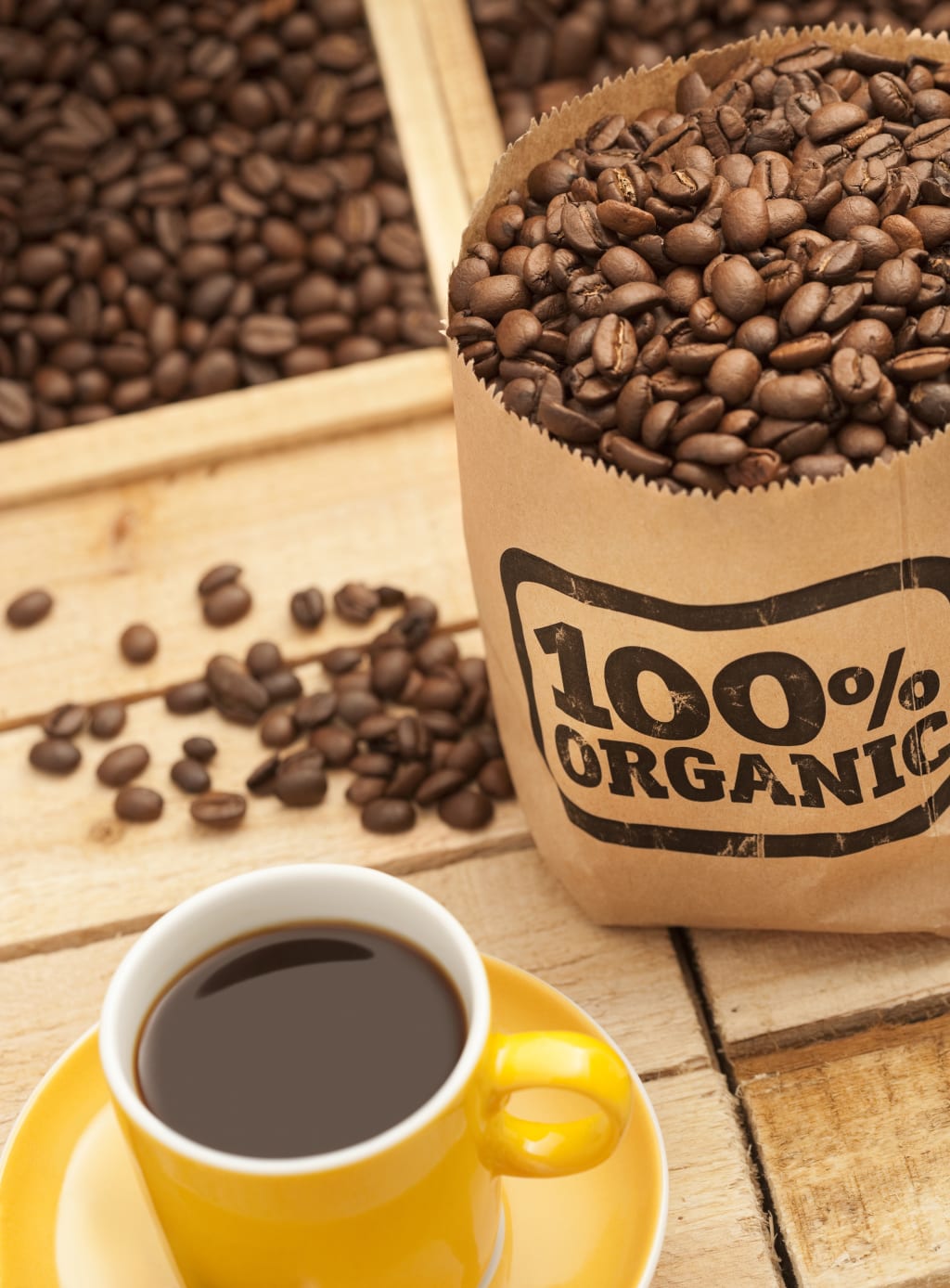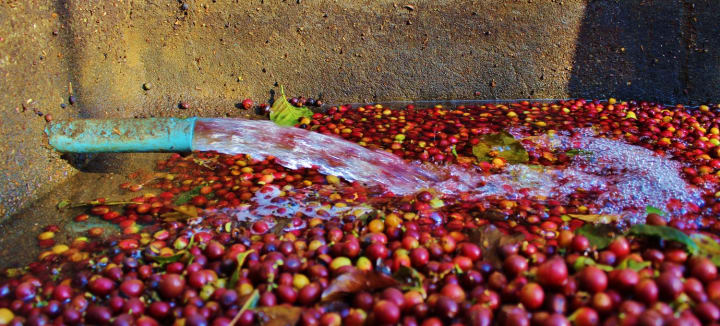All About Organic Coffee: How It's Made and the Benefits
Numerous studies and research have shown the significant benefits of planting and consuming organic coffee—in both regards to the environment and to personal health.

As the world is trending towards healthy consumption and natural foods, organic coffee is a popular topic that most people are paying attention to.
There is no doubt that this is a beverage that the majority of people consume at least once during the day.
Numerous studies and research have shown the significant benefits of planting and consuming organic coffee—in both regards to the environment and to personal health.
As a coffee lover, it is no denying that more knowledge you have about organic coffee will increase the appreciation you have for every cup of coffee in the morning, especially if they are made from freshly roasted coffee beans.
But now you might already wonder, "What is organic coffee?"
Organic Coffee Standards
By definition, organic coffee must be the product of synthetic substance-free growth.
That means the organic coffee should not contain any additional artificial components in fertilizers, pesticides, etc.
There are various elements that will decide whether the coffee meets all the standards for organic certification.
Organic Fertilizer
The critical criteria of organic standards is fertilizer, which can also be the leading factor in deciding whether a coffee crop can be verified and certified as organic.
Committee such as the United States Department of Agriculture (USDA) are the primary organizations that can grant the organic stamp for coffee in the US market.
USDA has issued the regulation that any synthetic component, such as phosphate, potash, and nitrogen, will make the fertilizer inorganic.
The good substitution for phosphate, potash, and nitrogen components are animal manure, be it chicken manure or cattle manure, compost, or other bio-green substances.
Organic Processing

Wet-Processed Coffee
For non-organic coffee, the wet process is usually used to remove the coffee beans or seeds before the drying phrase.
The non-quality fruit from coffee cherries will emerge on the water surface, while the harvestable ones will sink down to the bottom.
Wet processing can create significant coffee pulp and other extra wastes.
Dry processing is the long-established method that is natural and often employed in organic coffee processing.
After hand-picked harvesting, the coffee beans or cherries must be kept in dedicated bags that are not contaminated with any chemical substances.
The fruit from the coffee cherry will be washed and dried under the sun naturally.
The dry process will make sure that there's no extra usage of chemical substance involved, just natural conditioning.
Organic Roasting
The final coffee product that is sold to the consumer is usually roasted.
Coffee roasting is the complicated process that can alter the final taste of the coffee, thus why each coffee type requires a unique roasting method.
For the roasting process to be considered organic, the roaster must not use any artificial chemical substances to boost the time completion of the process.
The roaster must also protect the integrity of the organic coffee during this final stage by not letting any contaminated substances induced during the process.
However, it is crucial to remember not to mix up your knowledge with the myths of organic coffee. These myths are as follows:
Organic coffee farms must not use pesticides.
This is not correct because, just like fertilizers, there can be organic pesticides that are eco-friendly and better for the coffee crop.
Remember this the next time you check on the label of organic coffee bags: The use of organic pesticides meets the standard of certified organic coffee.
Organic coffee will guarantee the taste quality.
Once again, many crucial factors will decide the outcome of your cup of coffee besides the organic trait.
These factors can range from:
- The selection of coffee seeds to plant.
- Proper harvesting techniques.
- The refined method in the roasting process.
- The quality of stored coffee overtime.
- The grinding machine that is used to make your cup of coffee.
This is not to include other subjective elements such as personal preference on coffee. (For example: Bitterness, sweetness, etc.)
The question remains what can the standards for organic coffee provide?
Continue reading to understand the effects of using organic fertilizer on a coffee farm.
Environmental Benefits of Organic Coffee
By using organic fertilizers, farmers can reduce the erosive deterioration in their farming soil while also increasing the soil’s natural resistance against diseases.
It will ensure farmers more than one crop of healthy and organic coffee because the soil will receive additional natural nutrients for the next planting and harvesting season.
You should agree by now on the fact that using organic fertilizers will have a significant impact on their environment in the bigger picture.
With the discussion above, let's switch to another related and essential topic in respects to organic coffee, which coffee enthusiasts will love to read.
The Health Benefits of Consuming Organic Coffee
Thanks to the strictness of the organic certificate, organic coffee is with no doubt more costly to grow and more expensive to the consumer’s end.
However, the health benefits that organic coffee provides are really worth the money.
The usage of artificial chemical substances or synthetic additives in fertilizers or pesticides are to boost the yield outcome of each crop.
As a result, there might be small residue of the chemical substance that can add up and lead to painful illness, or worse cancer in the long run.
By consuming organic coffee, you can set your mind at ease about these harmful effects on both the environment and on your precious health.
All you have to do enjoy is to lay back, relax, and enjoy your every morning with the freshness of your 100 percent organic coffee cup as a way to kickstart your work’s productivity.
Nonetheless, there are other vital beneficial gains from consuming healthy organic nutrients in coffee such as:
Reducing Stress and Increasing Mood
There is always a good reason why a majority people prefer to have a cup of coffee in the morning.
It has been shown in various studies that coffee plays an instrumental role in reducing stress and headaches.
As the outcome, you are more likely to be in a fresh state and good mood to work and live happily, thanks to the daily consumption of healthy and organic coffee.
Improving the Immune System
Coffee contains a plentiful amount of antioxidants, elements to fortify a body’s immune system.
A proper routine of coffee consumption will let your body ingest the day's required antioxidants, which can improve your overall health.
Moreover, coffee can also reduce the risk of harmful diseases such as Alzheimer, diabetes, etc.
Boosting the Body’s Metabolism
Conventional coffee contains caffeine, which is the central element to increase the metabolism of the body.
Metabolism is the mechanic that keeps your every cell in a human body functional.
This also means that the caffeine in coffee will boost your metabolism molecules.
Therefore, coffee can help to maintain the nervous system while burning down unnecessary body fat.
However, these short-term benefits can be overturned by the fact that the body will keep adjusting to the caffeine element, thus making it unsubstantial in the long run.
With conventional coffee, a person will have to consume more than the usual suggested amount. This is when the organic coffee comes in with the beneficial decaffeinated process.
How is organic coffee decaffeinated?
The decaffeinated process (or decaf for short) is the process of reducing the caffeine substance in coffee by 95 percent.
This will allow the coffee to retain about 5 percent of caffeine, which is important to the taste and the metabolism benefits mentioned above.
However—unlike conventional coffee—in the chemical decaf process, organic coffee employs the technique called “Swiss Water Decaf” (SWD).
SWD is the only method that is certified organic by all health committees worldwide.
This decaf process can reduce caffeine to 99 percent, thus letting people enjoy the proper amount of caffeine in their coffee without being addicted to the stimulant.
Where to Get Organic Coffee
Now that you fully understand the definition of organic coffee and their overall benefits over the conventional coffee, you must be interested in where to find this healthy beverage.
Do not worry, there are many places that you can find and purchase your favorite organic coffee.
In the Supermarket: A lot of stores and supermarkets will have a section for coffees that you can browse through. Remember to look or the organic label to know if the coffee has been certified.
If you want to have more organic options to pick from, you can visit organic stores that only sell natural products. That way you can select through a variety of famous brands for your organic coffee.
At Fair Trade Shows: Fair Trade is also a good place to look for the newly introduced organic coffee brands. Here, you'll get the chance to meet with the farmers that grow the coffee.
Discuss with them about their organic coffee to know if it is the right type for you. Use all the knowledge that you have learned in this article—such as fertilizers, pesticides, decaf process, etc. to get more information about the new organic brand.
On the Internet: Another good way to buy organic coffee is online.
E-commerce websites like Amazon offer a lot of high quality organic coffee products and brands. Better yet, you can spend more time to read about them—and do your research before making the final purchase decision!
About the Creator
Miguel Garriga
I am Miguel Garriga writer of Coffee Style Today. I am passionate about coffee. This passion fueled my desire to create this online platform! Let my expertise and passion guide you towards making the right decision!






Comments
There are no comments for this story
Be the first to respond and start the conversation.